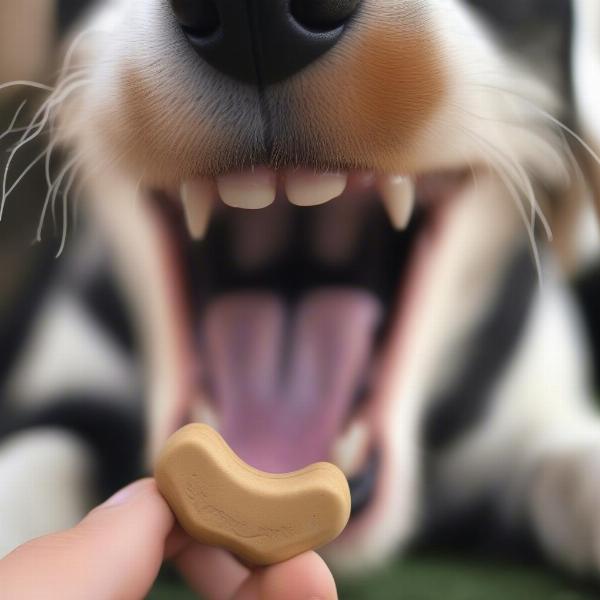Horse balls, also known as Jolly Balls or Horse Play Balls, are a popular and durable toy choice for many dog owners. While originally designed for horses, these large, sturdy balls have become a canine favorite for their engaging play possibilities. But are they right for every dog? This guide will delve into everything you need to know about horse balls for dogs, from choosing the right size to understanding the benefits and potential risks.
Choosing the Right Size Horse Ball for Your Dog
Selecting the correct size is crucial for your dog’s safety and enjoyment. A ball that’s too small presents a choking hazard, while one that’s too large can be frustrating and difficult for your dog to manipulate. Generally, horse balls come in sizes ranging from mini (suitable for small breeds) to extra-large (for giant breeds). Observe your dog’s play style and consider their breed size when making your selection. A good rule of thumb is to choose a ball that your dog can comfortably nudge and chase without struggling.
Benefits of Horse Balls for Dogs
These robust toys offer a range of benefits, both physically and mentally. The act of pushing, chasing, and gnawing on a horse ball provides excellent exercise, helping to burn off excess energy and promote muscle development. Additionally, the mental stimulation offered by these toys can help alleviate boredom and reduce destructive behaviors. The unpredictable bounce of a horse ball can also keep dogs entertained for extended periods.
Potential Risks of Horse Balls for Dogs
While generally safe, it’s important to be aware of the potential risks associated with horse balls.
Teeth Wear and Tear
 Mòn răng do bóng ngựa
Mòn răng do bóng ngựa
One common concern is the potential for excessive teeth wear. Continuous gnawing on the hard plastic can cause abrasion over time. While this is less of a concern for dogs with strong teeth, it can be problematic for puppies or senior dogs with weakened enamel. Supervising play and offering alternative chew toys can mitigate this risk. Look for specifically designed dog toys made from softer, more pliable materials for regular chewing.
“Always supervise your dog, especially puppies, when they’re playing with a horse ball,” advises Dr. Emily Carter, DVM. “This allows you to monitor their interaction with the toy and intervene if necessary.”
Cleaning and Care of Your Dog’s Horse Ball
Keeping your dog’s horse ball clean is essential for maintaining good hygiene. Regularly wash the ball with soap and water, paying particular attention to any areas where dirt or debris may have accumulated. Ensure the ball is completely dry before allowing your dog to play with it again.
Are Horse Balls Right For Your Dog?
Ultimately, the decision of whether or not to introduce a horse ball to your dog depends on their individual personality and play style. If your dog enjoys robust play and has a penchant for chasing and fetching, a horse ball could be a great addition to their toy collection. However, for dogs with delicate teeth or those prone to destructive chewing, other toy options might be more suitable.
“Remember to introduce any new toy gradually and monitor your dog’s interaction with it closely,” adds Dr. Carter. “This will help you assess whether the toy is a good fit for your dog’s individual needs.”
Conclusion
Horse balls can provide a stimulating and engaging playtime experience for many dogs. By choosing the right size, supervising play, and understanding the potential risks, you can ensure that your dog enjoys this popular toy safely and responsibly. horse ball for dogs are a great way to keep your dog entertained, but remember to choose wisely.
FAQ
-
What size horse ball is best for a Labrador Retriever? A standard or large size horse ball is typically suitable for a Labrador.
-
Can puppies play with horse balls? Yes, but supervision is crucial. Choose a mini size and monitor for excessive chewing.
-
What if my dog tries to eat the horse ball? Discontinue use immediately and consult with your veterinarian.
-
How can I prevent my dog’s teeth from wearing down? Offer alternative chew toys made from softer materials.
-
Are there any horse ball alternatives for dogs with sensitive teeth? Yes, many softer, more pliable toys are available.
-
Where can I buy a horse ball for my dog? Pet stores, online retailers, and even some farm supply stores carry them.
-
How often should I clean my dog’s horse ball? Clean it regularly with soap and water, especially after outdoor use.
Further Reading
No related articles found.
About ILM Dog
ILM Dog is your trusted international resource for all things dog-related. We provide expert advice on everything from breed selection and puppy care to senior dog health and training. Our goal is to empower dog owners worldwide with the knowledge and resources they need to provide the best possible care for their furry companions. Our team of experienced writers and canine professionals is dedicated to bringing you reliable, practical information on all aspects of dog care, including nutrition, grooming, and choosing the right products and accessories. horse ball for dogs can be a fun addition to your dog’s toy collection. Contact us today for personalized advice and explore our comprehensive resources! Email: [email protected], Phone: +44 20-3965-8624.